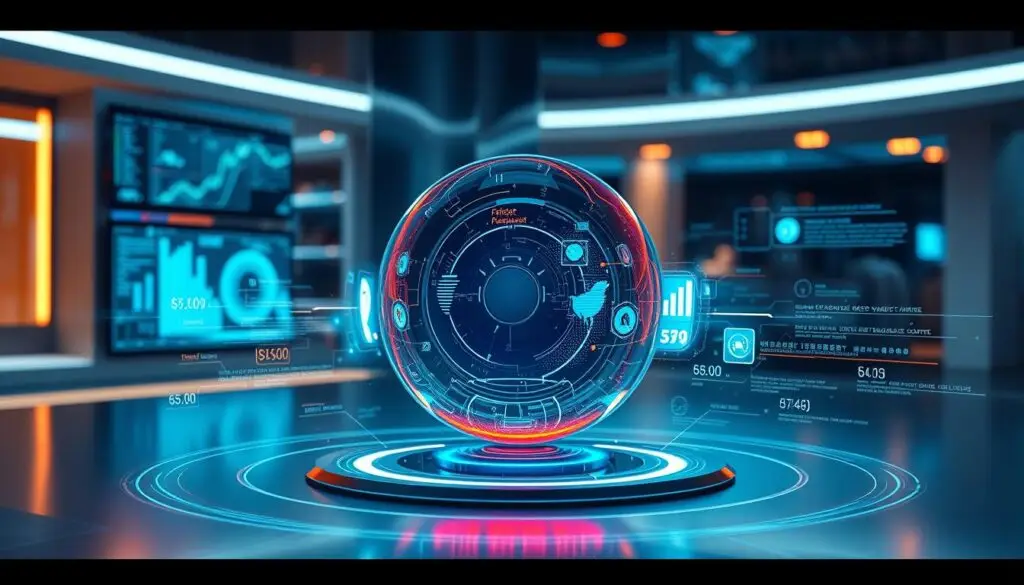The accidental leak in the tech world has put Jarvis Google in the spotlight. It shows a new level of skill in digital assistants, challenging giants like ChatGPT and Siri. Jarvis Google aims to change how we interact with smart services, making tasks easier on many devices.
But, Jarvis’s growth raises questions about privacy and its impact. It will work closely with Google services, like Chrome and Google Search. This raises hopes for better convenience but also worries about our personal data. Will the benefits of Jarvis’s advanced AI outweigh the risks?
Key Takeaways
- Leak spotlighted Jarvis as an autonomous web-browsing AI, differentiating it from data-dependent counterparts.
- Functionality suggests Jarvis could be the most substantial revision to Chrome since 2008.
- Ethical considerations around real-time data use and privacy are core discussions within the AI community.
- Google, silent on the leak, could be percolating an official declaration on Jarvis’s utility and release.
- Competition is intensifying amid advancements in Google’s AI, with Gemini paving the way for Jarvis’s arrival.
- The build-up to Jarvis’s deployment scrutinizes the balance of automation, information gathering, and user privacy.
Introducing Jarvis Google: A New Contender in AI Personal Assistants
The digital world is changing fast, and the Jarvis app is a big step forward in AI. It’s a next-generation digital assistant that uses machine learning and Google search to change how we interact with tech.
What Sets Jarvis Google Apart in Voice Assistant Technology
The Jarvis app is more than just a voice assistant. It combines Google’s Gemini AI with advanced voice recognition. This makes it easier and more natural to use, improving how digital assistants work on all devices.
The Potential for Jarvis Google to Enhance Digital and Virtual Assistant Roles
Jarvis Google can do a lot, like automate tasks and work with Google apps. Its machine learning lets it get better over time, offering more personalized help.
| Feature | Jarvis Google | Apple’s Intelligence | Microsoft’s Copilot+ Recall |
|---|---|---|---|
| Core Technology | Google’s Gemini AI | Deep integration with device ecosystem | Recall capabilities enhancing workflow |
| Key Function | Automates online tasks like shopping and bookings | Enhances user experience across Apple devices | Streamlines tasks, integrates with Office Suite |
| Google Integration | Complete suite integration | Not applicable | Limited to Office applications |
| Accidental Leak Impact | Sparked debates on security measures | Not reported | Not reported |
Jarvis Google is set to launch in December 2024. A leak gave some users a peek, sparking excitement and talk about Google’s security. This leak showed off the digital assistant’s power before it’s even out.
Comparing Jarvis Google’s Features with Leading AI Models
In the world of voice assistants, Google’s Jarvis is a big player. It has advanced voice mode and works well with Google Search. This makes it a top choice for personal assistants. Let’s look at what makes Jarvis stand out, compared to Microsoft’s Copilot Vision, Apple’s Intelligence, and Anthropic’s Claude AI.
Advanced Voice Mode and Google Search Integration in Jarvis
Google has worked hard on Jarvis’s voice mode. It makes the assistant more user-friendly and adaptable. Jarvis can understand and answer complex questions by using Google Search.
Machine Learning Proficiency and Personalized Search Experience
Jarvis learns from user interactions better than many others. This is thanks to Google’s Gemini 2.0 technology. It’s great for tasks that need real-time data and coding.
Unlike Anthropic’s Claude 3.5 Sonnet, Jarvis works well with Google Workspace and Android. This makes it perfect for those in Google’s ecosystem. It offers a more unified digital experience.
Google is testing Jarvis with early previews and user testing. A closed beta phase is planned for mid-2024. This will help Google improve Jarvis before its official launch.
Jarvis is set to lead in AI advancements in browser environments. It meets high expectations and Google’s standards. This could set new standards for how we interact with digital assistants.
Privacy Concerns and Personalization in Google’s AI Models
AI technology has grown, raising internet privacy worries, especially with Google’s Project Jarvis. This AI model, built on Google’s Gemini 2.0, aims to change how we use the web. It automates tasks and gives a personalized search experience. But, it also raises big privacy questions about how data is handled and used.
Even though Jarvis makes web tasks easier, like shopping and booking, people are worried. They fear their online activities and personal info could be used for ads or shared without their consent. This could hurt their internet privacy.

There’s a growing need for AI that keeps user data private, like Apple’s Privacy Cloud Compute. This approach keeps data on your device, not in the cloud. It fits better with what users want: control over their data and AI benefits.
To tackle these privacy worries, AI projects like Jarvis need to improve data security and be clear about how they use data. They should have strong data handling rules and let users control their privacy settings. This balance is key to a personalized search experience and strong internet privacy.
By tackling these important issues, Google can make sure their AI progress is trusted and ethical. This will help create a safer and more reliable digital world for everyone.
Marketplace and Consumer Expectations for Jarvis Google and Competitors
Google is about to launch Jarvis, a top-notch virtual assistant. This has everyone excited and the market is changing fast. Jarvis is expected to change how we see AI in our daily lives.
How Google’s Entry into Advanced AI Affects User Demand
Google’s Jarvis is making people want more from their assistants. They want helpers that can do web tasks on their own. Jarvis can search the internet, buy things, and fill out forms by itself.
This shows what people now expect from an AI voice assistant. Google’s Gemini 2.0 makes it easy to use, just like people want.
OpenAI, Anthropic, and Other Tech Giants: A Race for AI Superiority
The AI world is getting more competitive. Big names like OpenAI and Microsoft are working hard to make the best AI. Google’s Jarvis is joining the race with advanced skills and secure transactions.
This could change how we use digital services. It might also make companies like Salesforce and Workday want to get into AI more.

| Feature | Google Jarvis | Competitors |
|---|---|---|
| AI Model | Gemini 2.0 | OpenAI’s ChatGPT, Microsoft models |
| Capabilities | Internet browsing, purchases, form autopilot | Limited to voice and simple task execution |
| Launch Timeline | December 2024 | Various stages of deployment |
| Integration | Specific to Google Chrome | Diverse browser support |
| Subscription Model | Initially for Gemini Advanced members | Open access or through existing services |
The launch of Jarvis is changing how tech companies use AI. It’s also raising the bar for what we expect from digital helpers.
Conclusion
Google’s Project Jarvis is changing how we interact with digital assistants. It uses machine learning to make our web browsing smarter. This means a big leap forward for AI in helping us online.
Project Jarvis can do things like research and book things for us. It’s designed to make our lives easier, especially for busy professionals. This makes it a key part of the future of AI.
Jarvis Google aims to make Google Workspace better. But it’s not alone; Anthropic’s Claude AI is also pushing the limits of AI. The Jarvis AI assistant can handle a lot of information, showing how AI will change our digital lives.
Apple is also getting into AI, showing how it’s becoming a big part of tech. This opens up new possibilities for how we use technology every day.
But Jarvis’s success also depends on keeping user privacy safe. Google and others need to make sure it fits well with our personal ways of working. Jarvis can understand and act on our requests, showing the power of AI.
Even so, we still don’t know all the details about Jarvis. This shows how fast and changing the world of AI is. It will be important for companies to keep up and innovate.

